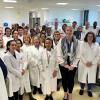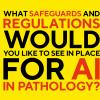This month we ask “What makes Congress the ‘go-to’ event for you?”

Janet Gilbertson

Principal Scientist
National Amyloidosis Centre, Royal Free London NHS Foundation Trust
As a naïve Trainee Biomedical Scientist in the early eighties, I was amused to witness the hype surrounding the upcoming IBMS Triennial, as Congress was known then. My first thought was: “What is all the excitement and buzz about?” My second was: “How do I get involved?”
I now look back on my years attending Congress, reflecting on the vast opportunities. The event was a vital tool in expanding my pathology knowledge early in my career, exposing myself to novel technologies and techniques, specialist training and understanding the importance of quality management. Not forgetting the invaluable hands-on experience received whilst trialling equipment at the vast trade show.
Now, at the height of my career, managing the clinical service for histopathology and proteomics at the National Amyloidosis Centre, I have transitioned from a naïve trainee to a leading scientist in my specialist field.
I have enjoyed attending the IBMS Congress over the last 25 years, using it as a platform to share my clinical knowledge and research in histopathology and the rare disease amyloidosis. I have been very privileged to present posters, facilitate workshops and deliver lectures.
Congress will always be the event I look forward to, from socialising with friends and networking with colleagues, to learning from the next generation of scientists.
Amy Read

Trainee Consultant Clinical Scientist
Gloucestershire Hospitals Foundation Trust
The major draw of Congress for me is that it gives context to the day-to-day work done in microbiology laboratories. Whilst we are conscious there is a patient at the end of every sample, it can be difficult to see how the daily work fits into the national and global picture. Regional networks act and plan based on local epidemiology, but it is important to appreciate the changing microbiology landscape resulting from the emergence of novel pathogens, climate change and migration. Talks given at Congress provide perspective and act as a reminder that our work feeds directly into data on national and global epidemiology and outbreaks.
The second selling point of Congress is that it encourages attendees to think about the future, offering attendees the chance to discover research and technologies with the potential to change how testing is delivered in the future. “Future thinking” is rounded out with talks focusing on accreditation, service and workforce planning and leadership and it is wonderful that these conversations are accessible to individuals of all grades and experience.
Finally, Congress provides a fantastic opportunity for networking and catching up with old friends. The amazing work undertaken by the biomedical workforce has been recognised in recent years and IBMS Congress gives us the opportunity to celebrate our successes and our bright future. I always leave with new knowledge and re-ignited enthusiasm for the daily work we all do. I hope the same for you.
Jeyrroy Anjalo Gabriel

Senior Biomedical Scientist
Dermatopathology Laboratory, St Thomas' Hospital, Synnovis Analytics
The IBMS congress is always a highlight of the biomedical science calendar and I have been fortunate to have attended a number of times over the years. The event offers a diverse range of educational sessions, including presentations by experts, workshops and seminars, which are helpful to stay updated on the latest developments in a broad spectrum of disciplines. It can be a wellspring of inspiration, with keynote speakers and industry leaders motivating creative thinking. I have found Congress also provides a platform to network with peers, exchange ideas and establish collaborations within the biomedical science community. Congress often includes opportunities for researchers to present their work through poster sessions or oral presentations, allowing you to share your findings and, for someone junior in their research career, it is a great opportunity to grow as a scientist and improve your public-speaking skills.
The event also features an exhibition where companies and organisations showcase their products, services and technologies, providing an opportunity to identify innovative solutions to issues. By attending Congress, you can broaden your global perspective, boost your knowledge base and get an insight into emerging technologies, all while forming lasting connections and recharging your enthusiasm for your career path.
Image Credit | Istock




